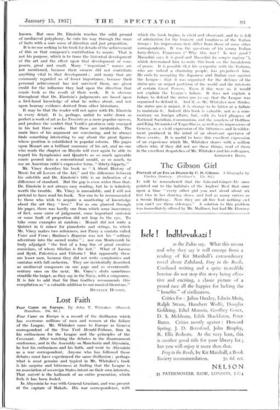Lost Faith
Fear Came on Europe is a record of the disillusion which has overcome millions of men and women at the failure of the League. Mr. Whitaker came to Europe as Geneva correspondent of the New York Herald-Tribune, firm in his enthusiasm for the League and the principles of the Covenant. After watching the debates in the disarmament conference, and in the Assembly on Manchuria and Abyssinia, he lost his enthusiasm and his faith, and went to Abyssinia as a war correspondent. Anyone who has followed those debates must have experienced the same disillusion ; perhaps what is most genuine and typical in Mr. Whitaker's book is his surprise and bitterness at finding that the League is an association of sovereign States intent on their own interests. That naiveté is the hallmark of an entire generation, which feels it has been fooled.
In Abyssinia he was with General Graziani, and was present at the capture of Makale. His war correspondence, with which the book begins, is vivid and observant, and he is full of admiration for the bravery and toughness of the Italian troops : his impressions here differ from those of some other correspondents. It was the questions of his young Italian lorry-driver, Francesco (" Why this war ? Is war good ? Mussolini says it is good and Mussolini ha sempre ragione "), which determined him to write this book on the breakdown of peace. It is possible that his sympathy with the who are indeed a charming people, has prejudiced him. He ends by accepting the .Japanese and Italian ease against the League ; that it was organised for the defence of the status quo, an unjust partition of the world and the interests of certain Great Powers. Even if this were so, it would not explain the League's failure. It does not explain a failure to defend the status quo to say that the League was organised to defend it. And if. as Mr. ‘Vhitaker now thinks, the status quo is unjust, it is t range to be bitter at a failure to maintain it. Indeed, this book is valuable, not as a com- mentary on foreign affairs, but, with its brief glimpses of National Socialism, Comm unism. and the murders of Dollfuss and King Alexander of Yugo-Sla via, as well as its impressions of Geneva, as a vivid expression of the bitterness and bewilder- ment produced in the mind of an observant spectator of these events. It is useful to have this excellent expression of an experience which Mr. Whitaker shares with a million others who, if they did not see these things, read of them in the excellent despatches of Mr. Whitaker and his colleagues.
GORONWY EES.










































 Previous page
Previous page